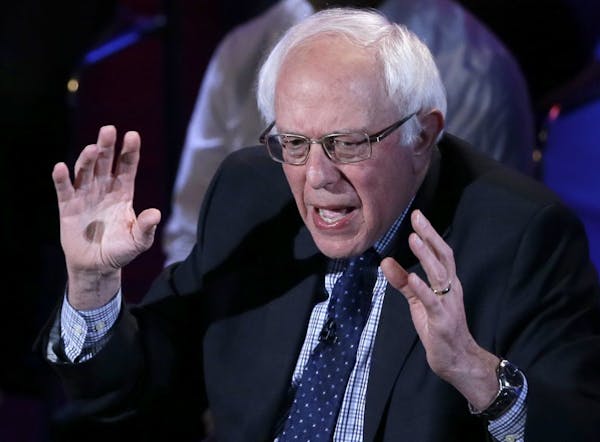"It is in vain to say that enlightened statesmen will be able to adjust [the nation's] clashing interests … to the public good. Enlightened statesmen will not always be at the helm."
James Madison, The Federalist No. 10
The founding fathers said there would be days like this. On the eve of the 2016 Iowa caucuses — which will plunge America into a maelstrom of election contests sweeping us dizzyingly toward actually choosing a new president — the understated warning from the chief author of our Constitution clangs like a fire bell.
Enlightened statesmen will not always be at the helm.
How innocent we were just seven months ago, when mainstream media stalwart U.S. News published a then-typical 2016 election preview titled "Fear, Loathing and Family Ties." The analysis, like so many at the time, lamented the inevitable, dreary approach of "a dynastic battle royale between America's foremost political families."
It was to be, without suspense, Jeb Bush vs. Hillary Clinton this year — pillars of prudent establishment moderation, whatever else they were (and better suited as running mates than rivals in some eyes, the magazine reported).
But now, whatever and whoever you are, chances are "fear and loathing" really does approximate your reaction to at least one of the momentum candidates as the real voting begins.
Grim, self-proclaimed revolutionist and socialist Bernie Sanders and narcissistic nationalist strong man Donald Trump certainly confront voters with clear choices. But one or the other of them (maybe both) may strike you as radically less than an enlightened statesman — maybe even as an authentic threat to values, rights and liberties you hold dear.
Still, the 2016 campaign at this hour is rather more interesting than a Jeb-Hillary mush and mud fight, isn't it? What's more, it makes an excellent opportunity to celebrate Madison and the other framers, who luckily left us a government explicitly designed with the likelihood of future immoderate and intemperate leadership in mind.
It's a fine moment to reconsider the various foolhardy ways we modern Americans tend to undervalue and undermine the awkward, gridlock-producing checks and balances our political system places on the powers extremists might wield one day (maybe sooner rather than later).
Can Trump or Sanders actually win? That their success thus far has come as such a surprise to all of the great minds proves that Trump is right about one thing: The political and media big shots running America aren't as smart as they think they are. A deep cultural divide has opened in this country, and the nation's elite no long understands much about the working class. So, who knows?
From the beginning, I've watched boorish straw being spun into populist gold by the devilish elf Trumpelstiltskin in a largely nostalgic light, recalling pro wrestler Jesse Ventura's implausible election as Minnesota governor in 1998, with its demonstration of the uncanny appeal of a growling, scowling show-off telling off the powers-that-be.
Lately, discomfortingly like 1998, I've had unnerving conversations with people who are drawn to the celebrity candidacy, even though they are neither ignorant nor frivolous. These voters see clearly enough that Trump lacks the conventional temperament and knowledge base for the presidency.
But what they also see is that the showman can get away with telling the politically correct thought police where to stick their higher consciousness (while delivering comeuppance to the media, all across the spectrum, for long since confusing politics with show business). All of this delights Americans who feel patronized and bullied by turns. They often may not even agree with Trump. But they love him for the enemies he has made.
Sanders' ideas are different (sometimes — he and Trump stand shoulder to shoulder as ardent trade protectionists). But his magic, too, is in his indignant denunciation of the status quo, his proud impracticality, his righteous recklessness.
Scholars have distinguished two kinds of political engagement — politics as a "consumption good" or politics as an "investment." Political investors seek to advance their interests and beliefs as far as practically possible under existing conditions. Political consumers seek the pleasurable experience of fighting for pure, uncompromised ideals, even if doing so worsens the tangible results.
So far in the 2016 campaign, political consumers are dominating the market.
Yet even if these appetites produce a Sanders or a Trump presidency, the Ventura precedent suggests it might deliver another surprise, and a welcome one. In his official acts (as opposed to his celebrity antics), Gov. Ventura largely steered a mainstream course, delegating vigorously to decent public servants he placed in key jobs. A President Trump or Sanders might adjust to reality, too.
That's likely, because America's complex and cumbersome system of government constrains every office holder, making it improbable that even a champion demagogue could enact destabilizing innovations, at least not without major compromise.
This is why debates over the proper boundaries on a president's executive orders matter. It's why the much-criticized Senate filibuster, which makes passing controversial laws difficult, shouldn't be carelessly discarded. It's why limits should be enforced on a president's war powers and on the government's right to spy on citizens. It's even why we must question tough-on-crime measures like the psychiatric commitment of sex offenders after they've served their prison terms.
Whatever unchecked powers we grant to government, or any one branch of government — enlightened statesmen will not always be at helm.
If only by reminding us of that, the 2016 campaign has already done the country good.
D.J. Tice is at Doug.Tice@startribune.com.
D.J. Tice: For this Minnesota legislator, action targeting child abuse is intensely personal

D.J. Tice: No room for debate — it's been a great career

Dogmas of the stormy present confuse Civil War debate



